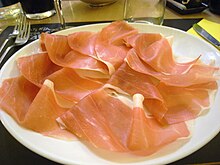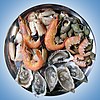Salumi: Difference between revisions
Content deleted Content added
JackkBrown (talk | contribs) Removed repetitive wikilink Tags: Visual edit Mobile edit Mobile web edit Advanced mobile edit |
JackkBrown (talk | contribs) "Genoa salami" is NOT Italian, I don't know who put it here. "Salame genovese di Sant'Olcese" IS Italian Tags: Mobile edit Mobile web edit Advanced mobile edit |
||
| Line 31: | Line 31: | ||
* [[Pancetta]] – made of pork belly meat |
* [[Pancetta]] – made of pork belly meat |
||
* [[Salami]] – cured sausage, fermented and air-dried meat |
* [[Salami]] – cured sausage, fermented and air-dried meat |
||
** [[Genoa salami]] |
|||
** {{lang|it|[[Salame Felino]]}} – traditionally produced in [[Felino]] and other towns in the [[province of Parma]], qualifies as a {{lang|it|[[prodotto agroalimentare tradizionale]]}} (PAT) |
** {{lang|it|[[Salame Felino]]}} – traditionally produced in [[Felino]] and other towns in the [[province of Parma]], qualifies as a {{lang|it|[[prodotto agroalimentare tradizionale]]}} (PAT) |
||
** {{lang|it|[[Salame genovese di Sant'Olcese]]}} |
** {{lang|it|[[Salame genovese di Sant'Olcese]]}} |
||
Revision as of 17:58, 15 April 2024
This article relies largely or entirely on a single source. (April 2024) |




Salumi (sg.: salume) are Italian meat products typical of an antipasto, predominantly made from pork and cured. Salumi also include bresaola, which is made from beef, and some cooked products, such as mortadella and prosciutto.
The word salumi, 'salted meat', derives from the Latin sal, 'salt'.[1]
Examples of salumi include:
- Prosciutto – dry-cured ham, thinly sliced and served uncooked (prosciutto crudo)
- Prosciutto di Parma
- Prosciutto di San Daniele
- Speck Alto Adige – dry-cured ham from South Tyrol, Italy
- Culatello
- Culaccia / culatta
- Capocollo, also known as coppa or capicola – Italian and Swiss pork cold cut
- Bresaola – air-dried and salted beef
- Cotechino – slow cooked pork sausage
- Cotechino Modena – fresh pork sausage from Modena
- Guanciale – prepared from pork jowl or cheek
- Lardo – Italian cured and seasoned strips of pig fat
- Lonza and lonzino – salumi made from cured pork loin
- Mortadella – sausage made from finely ground cured pork
- 'Nduja – Calabrian spicy, spreadable pork sausage
- Pancetta – made of pork belly meat
- Salami – cured sausage, fermented and air-dried meat
- Salame Felino – traditionally produced in Felino and other towns in the province of Parma, qualifies as a prodotto agroalimentare tradizionale (PAT)
- Salame genovese di Sant'Olcese
- Soppressata – dry salami
- Strolghino – thin, lean cured sausage
- Ciauscolo – smoked and dry-cured sausage from Marche and Umbria
See also
![]() The dictionary definition of salumi at Wiktionary
The dictionary definition of salumi at Wiktionary
- List of sausages
- List of dried foods
- Charcuterie – branch of cooking of prepared meat products, primarily from pork
- Salumeria – producer and/or vendor of cured pork (salumi)
References




